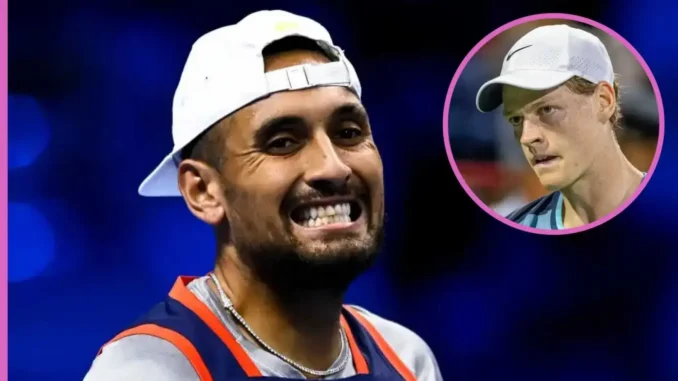
‘Showman’ Nick Kyrgios Criticized for Controversial Remarks as Former World No. 3 Labels Doping Rules ‘Crazy’
Nick Kyrgios, the mercurial Australian tennis star known for his outspoken personality and flair on the court, has once again found himself in the spotlight for his polarizing comments. This time, Kyrgios has drawn criticism for making what some consider “nonsense” remarks regarding the doping rules in tennis. Meanwhile, a former world No. 3 has weighed in on the topic, describing the current anti-doping regulations as “crazy.” The debate highlights the ongoing tension between athletes and the stringent protocols imposed by governing bodies like the International Tennis Integrity Agency (ITIA) and World Anti-Doping Agency (WADA).
Kyrgios Sparks Controversy—Again
Kyrgios, a self-proclaimed “showman” in tennis, has built his reputation as one of the sport’s most enigmatic figures. From his powerful serves and unorthodox shots to his on-court antics and candid interviews, he’s a player who divides opinion. However, his latest comments have sparked a fresh wave of backlash.
Speaking about recent doping controversies in tennis, Kyrgios appeared to downplay the seriousness of the issue, suggesting that some rules governing substances and testing protocols are overly harsh and arbitrary. While his remarks may have been intended to shed light on the pressures athletes face, critics have labeled them dismissive and uninformed.
One prominent analyst remarked, “Nick Kyrgios has always been a fascinating figure, but when it comes to sensitive issues like doping, his remarks often lack depth. Calling these protocols ‘crazy’ or nonsensical undermines the seriousness of maintaining a level playing field in sports.”
Former World No. 3 Backs Criticism of Doping Rules
Adding fuel to the fire, a former world No. 3 also voiced concerns about the current anti-doping regulations, describing them as “crazy.” While the ex-player, whose identity remains undisclosed in some reports, did not outright condone breaches of the rules, they highlighted the rigid nature of testing protocols and the potential for innocent athletes to be caught in the crossfire.
The former top-ranked player’s comments echo the sentiments of others who argue that certain substances banned by WADA may not enhance performance or provide a competitive advantage. Instead, critics claim these regulations can sometimes penalize athletes for accidental infractions or for substances with negligible effects on their physical abilities.
Recent Doping Scandals in Tennis
This debate unfolds against the backdrop of several high-profile doping cases that have rocked the tennis world. Most recently, Italian star Jannik Sinner faced scrutiny after allegedly testing positive for a banned substance, though his camp maintains his innocence and attributes the incident to a contamination error. The case has sparked a broader discussion about how the anti-doping system operates and whether it is applied consistently.
Tennis has not been immune to doping controversies in the past. Maria Sharapova’s 2016 suspension for meldonium usage remains one of the sport’s most notable cases. Although Sharapova returned to competition after serving her ban, the incident left a lasting mark on her career and reputation. Other players, such as Viktor Troicki and Marin Čilić, have also faced bans for doping violations, leading to questions about the transparency and fairness of the system.
Balancing Integrity and Fairness
While the anti-doping framework is designed to uphold the integrity of sport, critics argue that the rigidity of the system can lead to unfair consequences. Athletes are required to adhere to strict testing schedules and maintain detailed records of their whereabouts for random testing. Even minor slip-ups, such as forgetting to update their location in the system, can lead to penalties.
Supporters of Kyrgios’s and the former world No. 3’s perspectives argue that this level of scrutiny is invasive and places undue stress on athletes who are already under immense pressure to perform. However, proponents of the current system insist that such measures are necessary to prevent cheating and ensure a level playing field.
“The rules may seem excessive to some, but they are there to protect the integrity of the sport,” said a spokesperson for the ITIA. “Without these protocols, we risk creating an environment where doping becomes normalized.”
Kyrgios’s Role as Tennis’s Rebel
For Kyrgios, the controversy is another chapter in his ongoing saga as tennis’s resident bad boy. While his detractors often criticize his lack of professionalism and commitment, his supporters admire his willingness to speak his mind and challenge the status quo.
Kyrgios’s penchant for drama has made him one of the most marketable and talked-about players in the sport, despite his relatively inconsistent performances on the court. His outspoken nature, however, often lands him in hot water, with many accusing him of prioritizing headlines over thoughtful engagement with serious issues.
The Broader Implications
The debate over doping rules in tennis is unlikely to subside anytime soon. As the sport continues to grapple with high-profile cases and calls for reform, players, governing bodies, and fans must find common ground on how to balance the need for strict anti-doping measures with fairness and practicality.
Kyrgios’s comments, while controversial, underscore the importance of dialogue on this issue. Whether his approach to sparking conversation is effective or counterproductive remains a matter of opinion.
What’s Next for Kyrgios?
As Kyrgios prepares for the 2025 season, it remains to be seen whether his remarks will have any lasting impact on the ongoing discussions about doping in tennis. Known for his unpredictable nature, he could just as easily shift focus to his on-court exploits as continue stirring debate off the court.
One thing is certain: Kyrgios’s presence in tennis guarantees there will never be a dull moment. Whether he is dazzling crowds with his audacious shot-making or igniting controversies with his candid remarks, the Australian showman keeps the tennis world on its toes.
In the meantime, the tennis community must continue to evaluate the effectiveness and fairness of anti-doping regulations to ensure the sport remains both clean and equitable. For Kyrgios, his latest outburst serves as a reminder of the fine line between being a provocateur and a constructive critic in the public eye.
Leave a Reply